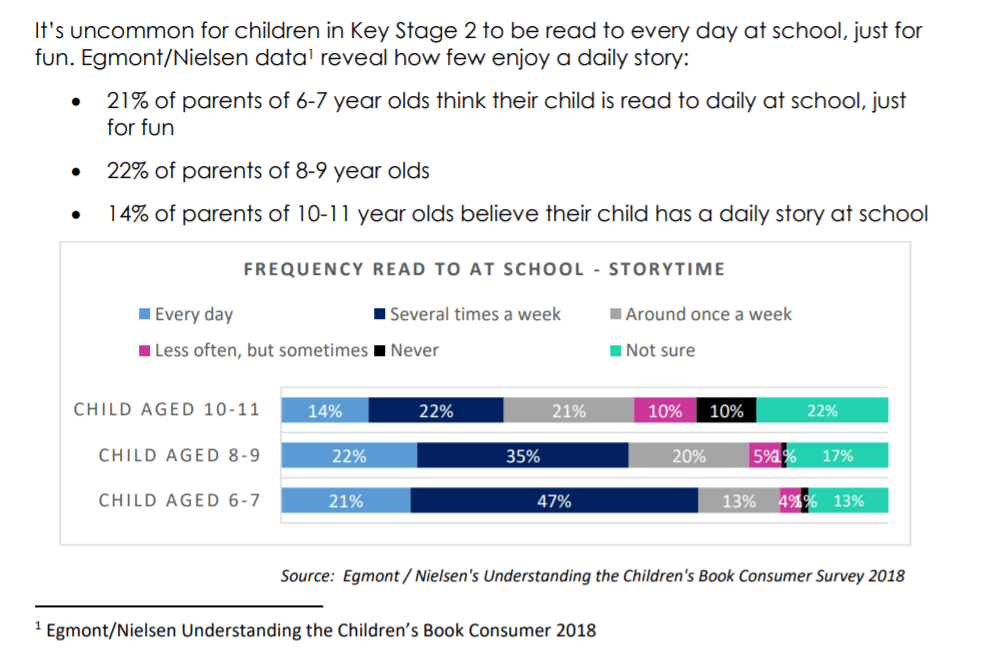Ross Montgomery is the much-loved author of Max and the Millions, Perijee and Me and Christmas Dinner of Souls. He is passionate about the importance of setting time aside every day so that primary school children are read to. Here he talks about Egmont’s ‘Stories and Choices’ research project and his top tips for reading aloud…

Can you tell us a bit about the ‘Make daily storytime compulsory for all primary school children’ petition?
Egmont recently did a research study called ‘Stories and Choices’ in a school in a deprived area in Stoke-On-Trent. They wanted to see what would happen if children aged 7-11 were read aloud to every day over a single term, with no assessment or comprehension questioning – just reading to them for the pleasure of being read aloud to. The results were pretty amazing – their reading attainment improved at more than twice the expected rate! The petition is aiming to safeguard a small block of time each day where children can experience being read aloud to each day. Once children can read independently, a lot of parents feel that being read aloud to is no longer necessary – but the research suggests that it’s still vital in showing children how to make sense of the written word, and also how to take pleasure from books. The petition is aiming to safeguard a small block of time each day where children can experience being read aloud to each day in school.

Why do you think storytime ISN’T a statutory requirement in the curriculum? Has storytime been pushed out of the curriculum?
It’s been pushed out because teachers are absolutely inundated with things they’re expected to do – if teachers did everything that they were asked to do, they wouldn’t sleep!! I imagine that most schools would certainly *encourage* storytime, but they wouldn’t make any provisions for it – it would be left to the individual judgement of overworked teachers to decide whether or not they have the time to read to their class, and most teachers will quite understandably choose to focus on one of the other two hundred things they’re expected to do on a daily basis. In short, they’re not being given the support.
I think this suggests a wider problem in teaching at the moment. I think a lot of adults, when they remember their school days, will vividly remember a time of being read to in class. It’s an intrinsic part of our understanding of what in school is – that just for a short time, everything stops, and we take a moment to understand what the point of all this learning could be. But in amongst all the assessment we currently demand of our children (and teachers), it’s something we’re forgetting to include.
We all became teachers for different reasons. But for me, the prospect of reading aloud to a class – of showing them what the books can be, and indeed what the world could be – was one of the reasons I wanted to teach in the first place. I know that will be the case for many others, too.
I think this suggests a wider problem in teaching at the moment. I think a lot of adults, when they remember their school days, will vividly remember a time of being read to in class. It’s an intrinsic part of our understanding of what in school is – that just for a short time, everything stops, and we take a moment to understand what the point of all this learning could be. But in amongst all the assessment we currently demand of our children (and teachers), it’s something we’re forgetting to include.
We all became teachers for different reasons. But for me, the prospect of reading aloud to a class – of showing them what the books can be, and indeed what the world could be – was one of the reasons I wanted to teach in the first place. I know that will be the case for many others, too.
What are your favourite memories of being read aloud to?
My mum was great at this, and read to me and my sister almost every night – I vividly remember her reading THE WIZARD OF OZ to us in bed. I also remember my English teacher reading us passages of GULLIVER’S TRAVELS, which I was really struggling with – it helped model for me how the narrative voice was supposed to read in the first place.
What are your top tips for reading aloud to children?
Don’t be embarrassed about really going for it!! It’s taken me years of doing it in public to feel confident doing voices, dramatic pauses, changing the pace and volume… the more the do it, the more of a reaction you’ll get from your listener! It can be pretty daunting when you first begin, but I promise the more you do it the better you’ll get at it. Also, watch other people read aloud – see what they do well, or notice when you’re finding it hard to understand what’s going on. Listen to audiobooks, too – for me, Michael Sheen reading LA BELLE SAUVAGE is a masterclass in how to create atmosphere and character with your voice!
This slideshow requires JavaScript.


